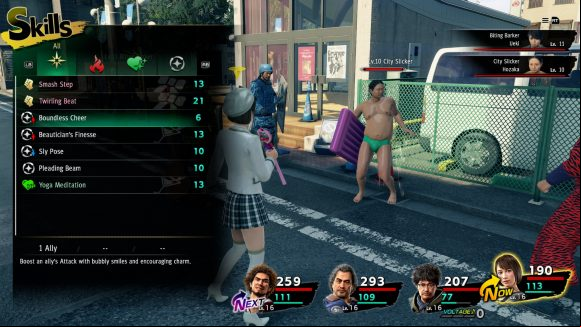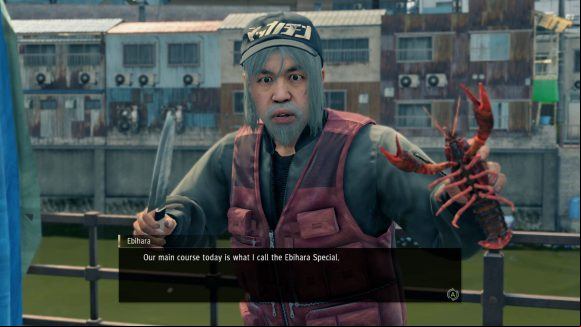With Yakuza: Like a Dragon, it feels like the series has evolved into its most social media-friendly form. This is exactly the game you would imagine if those screenshots of Nugget the Chicken and the gifs of disco-dancing Kiryu were all you had to go on.
This might just be the silliest Yakuza has ever been, and while that might squeeze out a bit of the gritty crime drama that's historically helped to ground the games, the new heights of ridiculousness that Like a Dragon has achieved are a delight all of their own.
I've spent several hours with a preview build of the PC version, with a save file getting me started at around five hours into the main story. That's the point at which the game opens up to let you fully explore the breadth of side content and minigames. If you've followed any previous coverage of Like a Dragon, you know this is a fresh start for Yakuza, with a new protagonist and a new turn-based battle system. The Yakuza series was always, sort of on the quiet, a set of role-playing games – upgradable skills, side-quests, and inventory systems were all common. But Like a Dragon goes full JRPG.
The combat still has some light action elements, akin to a Paper Mario or Chrono Trigger. Certain attacks will invite you to attempt timed button presses for additional damage, while others will cause area-of-effect damage. There's no active-time battle gauge here – nobody takes any active actions outside their turn – but both your party and the mooks you're fighting will shuffle around the field as you mull over your actions.
Certain attacks will have your character charge forward before delivering the final blow, damaging everybody in the way, or you could unleash a tornado of destruction that takes out a crowd all at once. But only if you time that attack when everyone's close together, and enemies will do their best to spread out. You can't specifically direct your character's movement, so the positional game is a bit random, but it helps give the battles enough strategic depth to make the change to turn-based combat feel not just acceptable, but right.
You have a party of up to four characters, who will swap in and out at various points in the story. Each character has a job, which works pretty much the same way as the Final Fantasy class system of the same name. Characters can change jobs at any time – via a work placement agency in the city, naturally – levelling up to reach new skills within each class.
As a foreman, for example, you've got a big sledgehammer for high-damage basic attacks, or big swinging blows that take down multiple enemies at the cost of MP. As a musician, you can play ballads to buff the party or toss CDs to attack at range. The 'homeless' job – yes, really – lets you toss breadcrumbs, drawing a flock of vicious pigeons upon your enemies.
As much fun as it is, the job system also does the unfortunate, er, job of highlighting the problematic elements that have been with the Yakuza series for years. Saeko, the lone woman of the party, exclusively gets access to traditionally feminine roles like hostess or idol, with abilities mostly built around charm and seduction. That's par for the JRPG course, and Saeko is a hostess as part of the story, but she's also the butt of plenty of gendered jokes, from dealing with an armpit licker at a club to a strip-search gag at a high-security location. Saeko at least comes at these situations with a world-weary attitude that prevents them from becoming too uncomfortable, but at best it's clichéd humour that doesn't match the strength of the rest of Yakuza's writing. At worst, well… it sucks.
Related: Check out the best action-adventure games on PC
The writing that doesn't rely on those tired tropes – which is, in fairness, most of it – is as creative and offbeat as anything in the series, elevated once again by an excellent English localisation (which continues the series' proud tradition of the most creative profanity in all of videogames). There's a substory where you befriend a crawfish, and another where a father shopping for his newborn's formula has a run-in with a gang of diaper fetishists.
I could just list a dozen more silly examples here, but the absurdity isn't really why these stories are so great – it's the disarming earnestness with which they play out. Take the dad's run-in with the diaper club, for example. A goofball fight with an underground fetish gang turns into a lesson on relationships and parental responsibility, as the father comes to realise that he's been working too many long hours and not spending enough time at home, helping to raise his own child. That gang leader, who was previously screaming "it's time to pacify this bitch!" helps the dad understand that he's been leaving his wife with too much of a burden, and everyone parts ways with a better understanding of themselves and each other, all while sappy music plays in the background. It's that combination of absurdist comedy and surprisingly genuine emotion that makes Yakuza's side content sing, and Like a Dragon's take on that tradition is making a strong first impression.
My one concern is how well Like a Dragon can manage its main narrative with the absurdity of everything that surrounds it. A big part of the Yakuza charm is that swing between the self-serious crime drama that comprises the main plot, and the bonanza of silliness that makes up everything else, and what little I've seen of the proper story here seems to lean a bit lighter than previous games in the series. But that could just be because I've been playing at the point in the plot where the pressure does lift a bit, so you can focus on minigames and side-stories.
As a long-time Yakuza fan, I'm even more excited for Like a Dragon after the few hours I've gotten to spend with it so far. This is starting to look like one of the best entries in the series based on the strength of its side content and combat system alone, and I can't wait to see what the rest of the game has to offer.
















